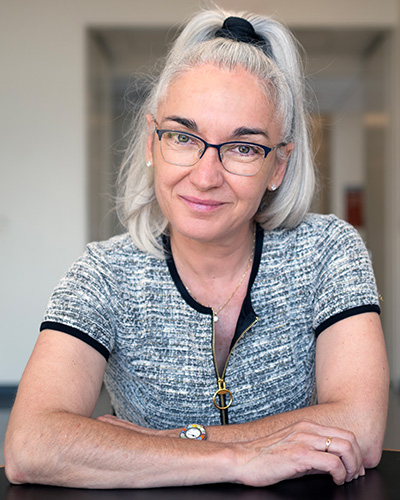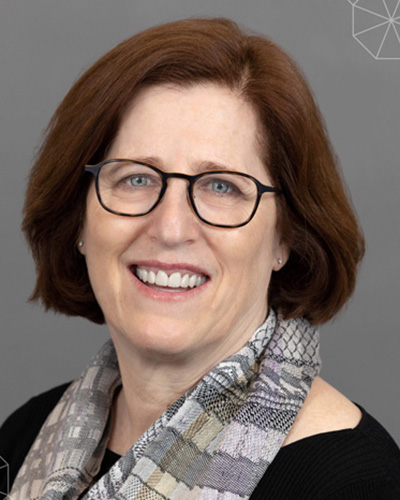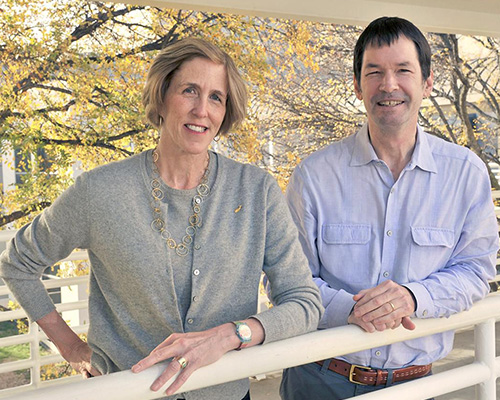Honors for Nogales, Marqusee, Cohen and Hobbs
Nogales receives Shaw Prize
Eva Nogales, a professor of biochemistry, biophysics and structural biology at the University of California, Berkeley, has won the 2023 Shaw Prize in Life Science and Medicine. Nogales, who is also a researcher at Lawrence Berkeley National Laboratory and a Howard Hughes Medical Institute investigator, shares the award with Patrick Cramer, director of the molecular biology department at the Max Planck Institute for Multidisciplinary Sciences in Germany.

Nogales was chosen for her use of cryo-electron microscopy to visualize early steps in human gene transcription, with a focus on the preinitiation complex, or PIC, and transcription factor II D, or TFIID, which recognizes DNA sequences marking the beginning of a gene and then recruits the rest of the PIC. Though TFIID and the PIC are scarce, fragile, and extremely flexible, Nogales revealed how TFIID rearranges as it binds promoter DNA and liberates the transcription factor TBP to initiate PIC assembly. She showed the steps of that assembly, how RNA polymerase II then engages DNA, and how the large transcription factor II H opens the DNA and brings the transcription start site to the active site of the polymerase. This work led to a model of how sequential PIC states allow transcription initiation.
Nogales won the American Society for Biochemistry and Molecular Biology’s Mildred Cohn Award in Biological Chemistry in 2016 for using cryo-EM to shed light on crucial multiprotein complexes. She was elected to the National Academy of Sciences in 2015 and the American Academy of Arts and Sciences in 2016. She was named a fellow of the American Association for the Advancement of Science in 2021.
The Shaw Prizes in astronomy, life science and medicine, and mathematical sciences were founded in 2002 as a legacy of the late Hong Kong entertainment producer Run Run Shaw and his wife, Mona Shaw. Sixteen past recipients are also Nobel laureates. Awardees in each category receive equal shares of $1.2 million as well as a medal and a certificate. The 2023 presentation ceremony will be held in November in Hong Kong.
Marqusee to head NSF directorate
Susan Marqusee has been chosen to lead the Directorate for Biological Sciences of the National Science Foundation in Alexandria, Virginia.

Marqusee, a distinguished professor of molecular and cell biology and a chemistry professor at the University of California, Berkeley, served for 10 years as associate director of UC Berkeley’s California Institute for Quantitative Biosciences and another decade as its director.
“Susan Marqusee’s vast experience will be a monumental benefit to NSF and our effort to tackle some of the most complex societal challenges,” NSF Director Sethuraman Panchanathan stated in a Berkeley News article.
Marqusee won the American Society for Biochemistry and Molecular Biology’s William Rose Award in 2012 and served on the society’s Council from 2015 to 2018. The ASBMB named her one of 20 fellows this year. She is a member of the National Academy of Science and the American Association for the Advancement of Science. Other honors include the Margaret Dayhoff Award from the Biophysical Society and the Dorothy Crowfoot Hodgkin Award from the Protein Society.
Marqusee began her NSF appointment on June 30. She aims to continue her research at Berkeley where she and her team study the structural and dynamic information encoded in the linear sequence of amino acids.
“Many of the world’s current challenges have solutions routed in biology, making this a particularly exciting time for biology and cross-disciplinary discovery,” Marqusee told the Berkeley News. “I look forward to partnering across the agency to enable participation, discovery and translation in the biological sciences.”
Hobbs and Cohen win Ross Prize
Helen Hobbs and Jonathan Cohen, researchers at the University of Texas Southwestern Medical Center, have received this year’s Ross Prize in Molecular Medicine from the Feinstein Institutes for Medical Research. The collaborators won the prize for their research defining the genetic risk factors for dyslipidemias and metabolic liver disease, which sparked the development of new treatments.

Hobbs is a Howard Hughes Medical Institute investigator. Her previous honors include the Breakthrough Prize in Life Sciences in 2016, the Fondation Lefoulon–Delalande Grand Prix Award and the Harrington Prize for Innovation in Medicine, both in 2018, and the Gerald Auerbach Award for Outstanding Translational Research and the Anitschkow Prize, both in 2019.
Cohen is a distinguished chair and professor in the Center for Human Nutrition at UTSW. He launched his career as a postdoctoral fellow there with Hobbs and Scott Grundy. With Hobbs, he has pinpointed the genes that help shape the metabolism of fats, cholesterol and triglycerides.
Both Hobbs and Cohen are members of the National Academy of Sciences.
The Ross Prize, now in its 10th year, goes to scientists whose research is likely to transform how we treat and cure disease. Past recipients have included ASBMB members Jeffrey Ravetch and Charles Serhan. This award, which comes with $50,000 for each honoree, was presented May 21 in conjunction with the New York Academy of Sciences as part of a half-day research symposium.
Enjoy reading ASBMB Today?
Become a member to receive the print edition four times a year and the digital edition monthly.
Learn moreGet the latest from ASBMB Today
Enter your email address, and we’ll send you a weekly email with recent articles, interviews and more.
Latest in People
People highlights or most popular articles

Building a career in nutrition across continents
Driven by past women in science, Kazi Sarjana Safain left Bangladesh and pursued a scientific career in the U.S.

Kiessling wins glycobiology award
She was honored by the Society for Glycobiology for her work on protein–glycan interactions.

2026 ASBMB election results
Meet the new Council members and Nominating Committee member.

Simcox wins SACNAS mentorship award
She was recognized for her sustained excellence in mentorship and was honored at SACNAS’ 2025 National Conference.

From humble beginnings to unlocking lysosomal secrets
Monther Abu–Remaileh will receive the ASBMB’s 2026 Walter A. Shaw Young Investigator Award in Lipid Research at the ASBMB Annual Meeting, March 7-10 in Washington, D.C.

Chemistry meets biology to thwart parasites
Margaret Phillips will receive the Alice and C. C. Wang Award in Molecular Parasitology at the ASBMB Annual Meeting, March 7-10 in Washington, D.C.
